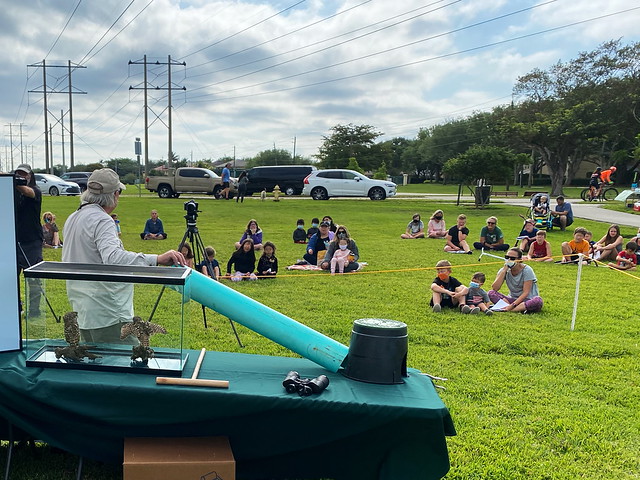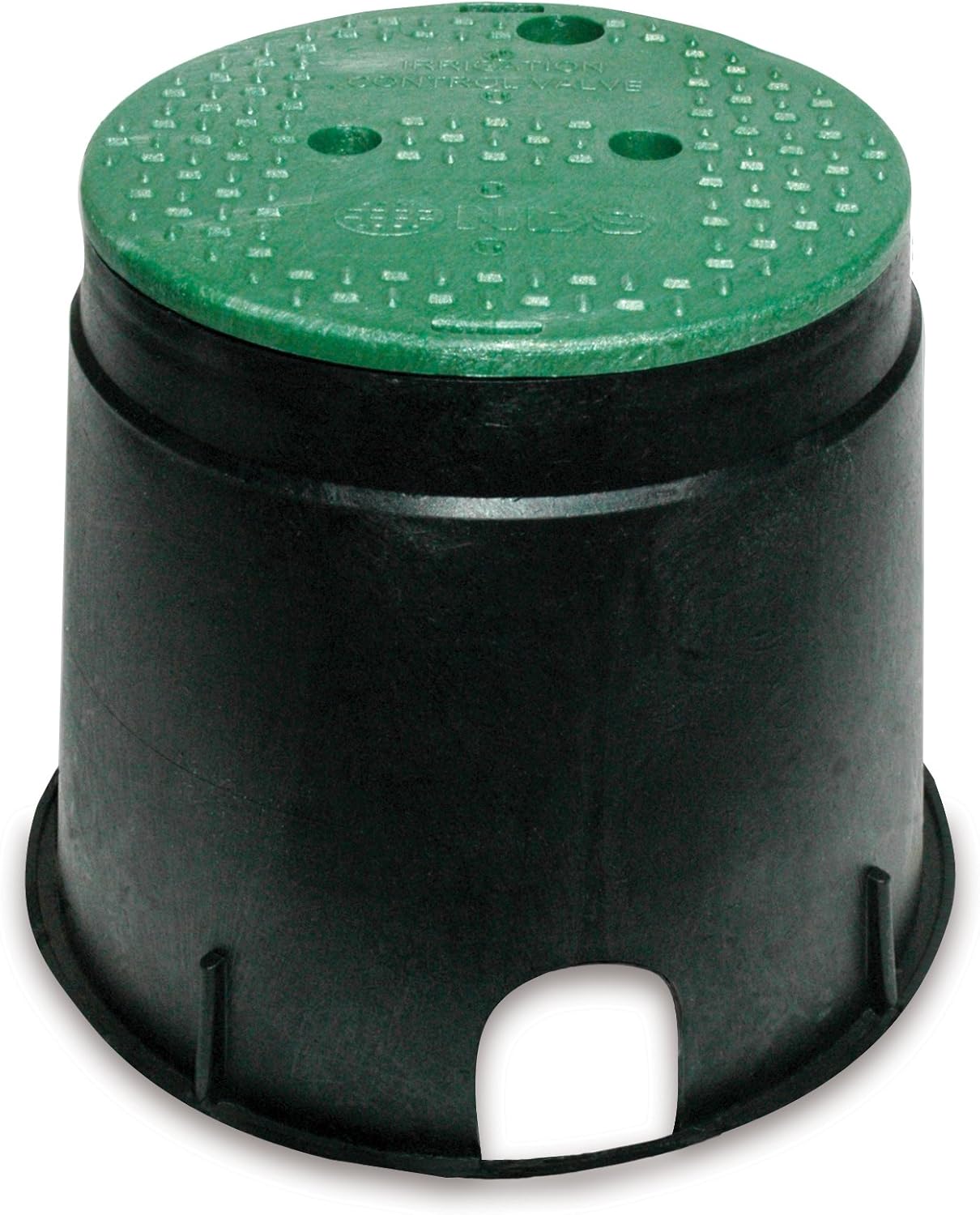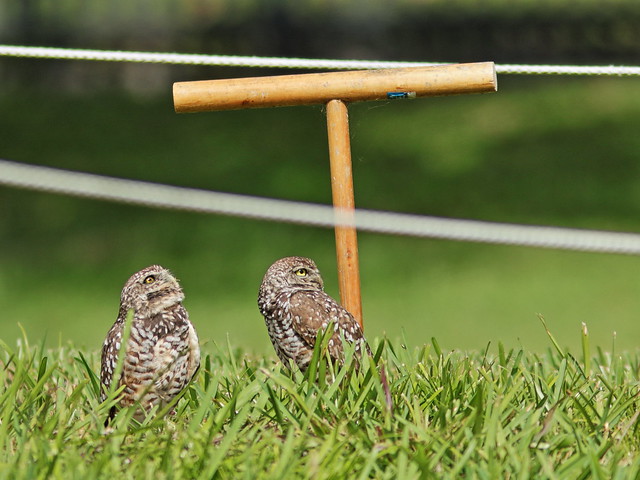Our local Audubon Society Chapter supports a very successful Project Perch to monitor and protect Burrowing Owls and increase their breeding opportunities by creating artificial nests. I recently participated in a "Burrowing Owl Prowl" sponsored by a residential community in Cooper City, Florida.
Major power transmission lines run through the heart of this community. The easement under the wires is maintained as an extensive grassy open space. The owls occupy burrows, usually located in hillocks which are slightly elevated above flood water level.
The owls are most easily seen at the entrances to their burrows in morning or evening twilight. Yet the participants in the walk had the opportunity to observe several from a safe distance, which is marked out at 10 meters (~33 feet). All my photos were taken from at least that distance:
The enthusiastic attendees were provided with a short presentation about Burrowing Owls, which occupied the area naturally and also use man-made burrows. Residents and community leaders exuded pride about their role in building the owl population, displaced by human development and activity.
The range of Burrowing Owls extends into parts of North, Central and South America. Although not designated as an Endangered Species in the US, nine States have listed it as Endangered, Threatened, or Species of Special Concern. It is also protected in parts of Canada and in Mexico.
Some had been relocated from construction sites, athletic fields and airports. They were shown this example of an artificial owl burrow.
It consists of a PVC pipe and a cylindrical bucket-like container with a screw top which is buried three feet down and serves as a "room." It has enlarged openings for the pipe and another hole opposite the pipe to allow the owls to dig extensively around the structure.
Very efficient excavators, they commonly extend their burrows up to ten feet away from the container and also create "back doors."
The South Florida Audubon team places a "T" perch near each owl burrow. This provides them with a vantage point from which to easily see insects and small vertebrates, their main food items. The elevated roost also allows them to detect and evade the hawks (particularly Cooper's Hawks) which prey on the owls:
The immediate areas around burrows are cordoned off with instructions to landscapers that, to avoid damage to the nests, motorized lawn mowers cannot be used within the protected area. Instead, the grass is maintained with string trimmers:
The Burrowing Owls are quite small-- about 9.5" (19-25 cm) long and weigh an average of only about 5.3 to 6.0 oz (150-170 g). In comparison, the length of European Starlings averages about 8.7" (22 cm).
These are two taxidermy owls who have sad tales about their demise:
Skywatch Friday
Weekend Reflections
Saturday's Critters
BirdD'Pot
Camera Critters
All Seasons
Wordless Wednesday (on Tuesday)
Natasha Musing
Our World Tuesday
Please visit the links to all these posts to see some excellent photos on display
________________________________________________










Beautiful.
ReplyDeleteOwls fascinate me. I've never seen a burrowing owl. Someday!!
ReplyDeleteHello kenneth
ReplyDeletea great project that campaigns for these little owls, I don't think we have this kind of owls here.
Greetings Frank
That's a new owl for me. Such interesting details!
ReplyDeleteHello Ken,
ReplyDeleteFantastic post and info on the Burrowing Owls. They are so cute. It is wonderful they are being helped along with the nesting site. I am glad the area is protected for these cute owls. The view of the sky and wetlands is beautiful. Awesome photos! Thank you for linking up and sharing your post. Take care, enjoy your day! Happy Weekend! PS, thank you for leaving me a comment.
They're very similar to our Little Owls, and just as angry looking.
ReplyDeleteHello.
ReplyDeleteInteresting project. Great photos.
Take care.
Great reflection and beautiful owls! There is an owl that flies over my head when I walk in the evening. I can't see any details just it's silhouette.
ReplyDeleteI'm so glad you particpated in this. I love owls of all kinds. My friend down in Broward County has burrowing owls in her backyard and had the State put up a similar marker to the one you showed. All the homes around this particular lake consider the owls "theirs" and want to protect them.
ReplyDeleteThe owls ever had a special quality in our family. My grandmother called my sister and me, her little owls. Lovely remembering.
ReplyDelete...and fantastisc captures here! Thank you for sharing.
Have a good week.
These are beautiful creatures! A delight for the eyes!
ReplyDeleteThank you for sharing at https://image-in-ing.blogspot.com/2021/04/cape-hatteras-lighthouse.html
I had no idea people built homes for burrowing owls. Marvelous!
ReplyDeleteOwls are so fascinating and quite cute. How great it is that they get some help when they need it.
ReplyDeleteThanks for being a part of 'My Corner of the World' this week!
Love the owls, love this jaunt with you, Ken. We are live again with #WW
ReplyDeleteStay safe and be well.
Owl is one of my most favourite bird and possibly my spirit animal as it always calls out to me. <3